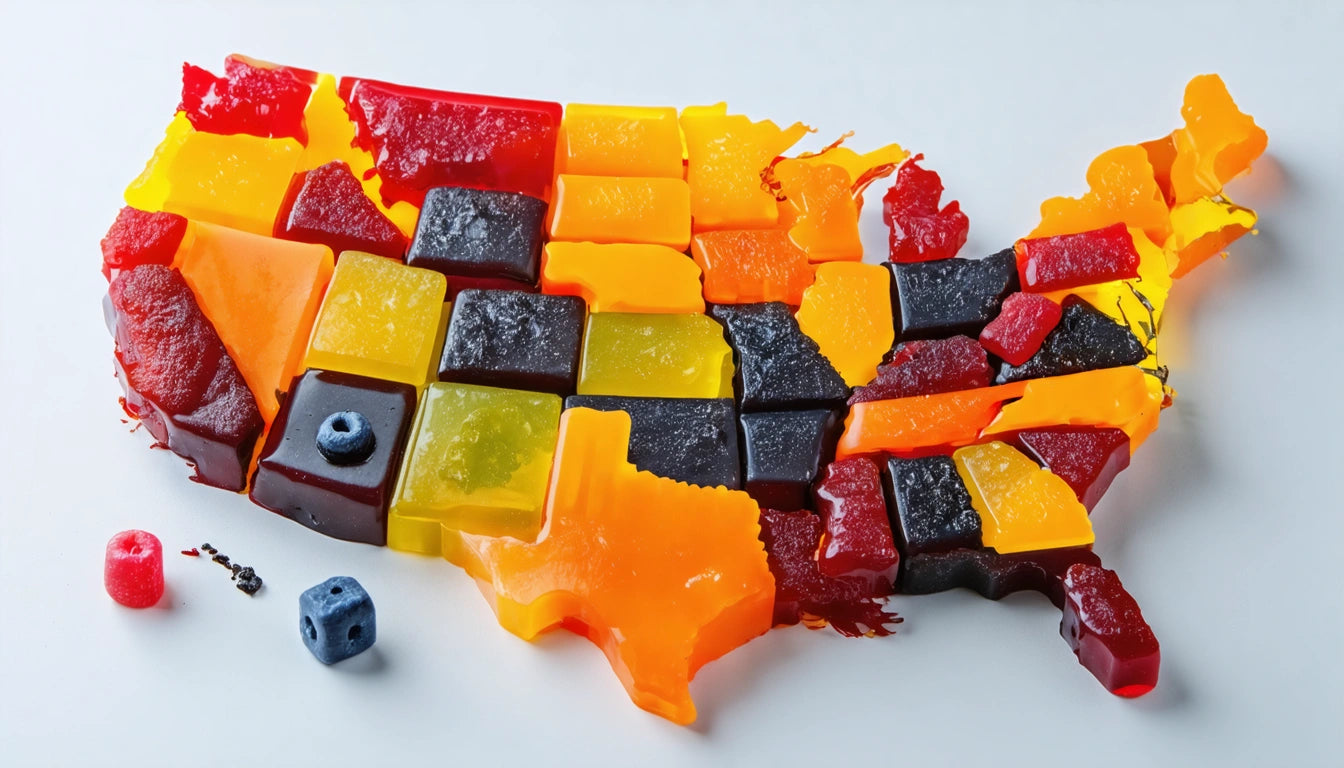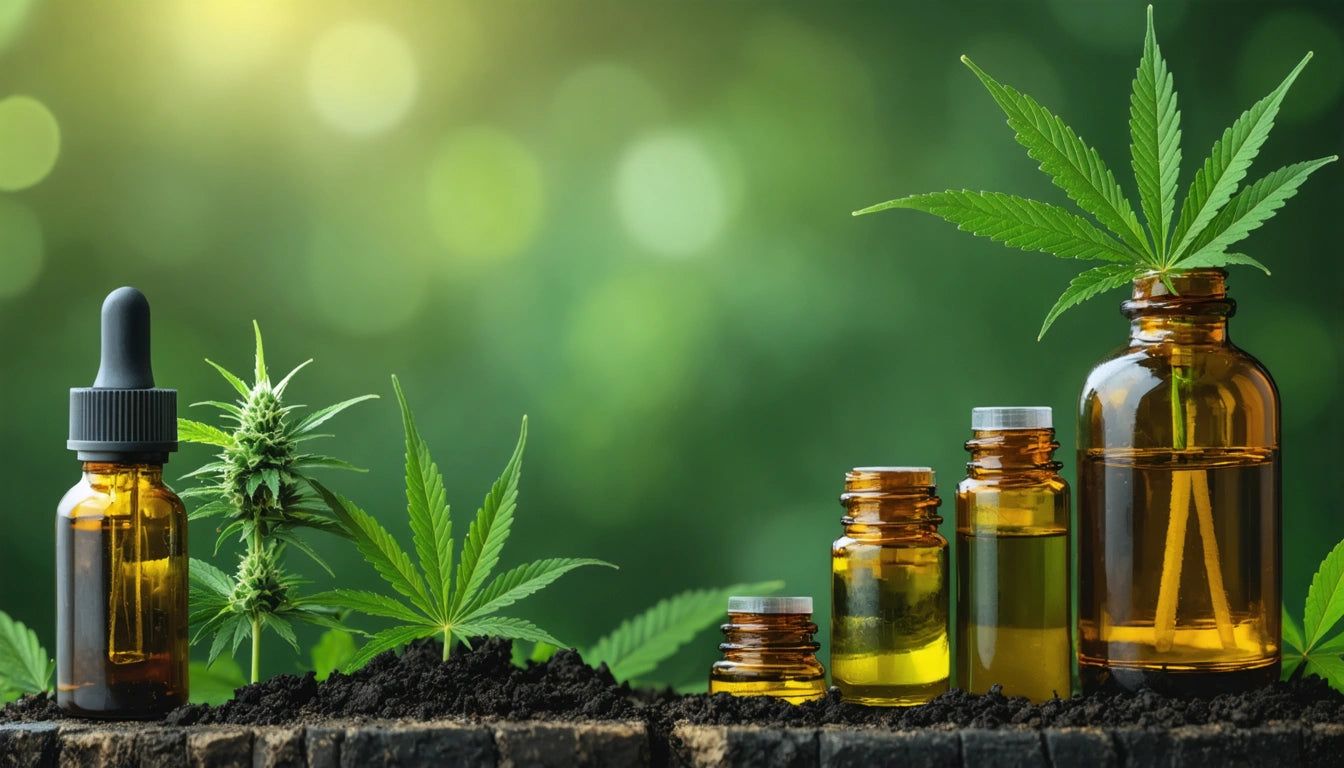Table of Contents
The Legality of Gummies: A State-by-State Guide
Cannabis-infused gummies have become increasingly popular across the United States, but their legal status remains complex and often confusing. Whether you're wondering if gummies are legal in Georgia, Tennessee, or any other state, the answer depends on several factors including the type of gummy, its ingredients, and your specific location.
Understanding Different Types of Gummies and Their Legal Status
Before diving into state-specific regulations, it's important to understand the different types of cannabis-infused gummies:
- CBD Gummies: Made from hemp-derived CBD with less than 0.3% THC
- THC Gummies: Contain delta-9 THC, the primary psychoactive compound in marijuana
- Delta-8 Gummies: Contain delta-8 THC, a less potent psychoactive compound
- Hemp Gummies: Made from hemp extract, typically containing CBD and minimal THC
Each type faces different regulations at both federal and state levels. For example, CBD gummies derived from hemp are federally legal under the 2018 Farm Bill, while THC gummies remain federally illegal but may be legal in states with recreational or medical marijuana programs.
Federal vs. State Regulations: Why Legality Varies
The legal status of cannabis gummies is complicated by the conflict between federal and state laws. While federal law still classifies marijuana as a Schedule I controlled substance, many states have enacted their own legislation permitting medical or recreational use.
For manufacturers and retailers, this creates a complex landscape requiring specialized equipment for compliant production. Many businesses invest in professional-grade cannabis processing equipment to ensure their products meet strict regulatory standards for potency and consistency.
Legal Status of Gummies by State
Are Gummies Legal in Georgia?
In Georgia, THC gummies are illegal for recreational use. However, low-THC oil (less than 5% THC) is permitted for registered medical patients with qualifying conditions. CBD gummies derived from hemp with less than 0.3% THC are legal.
Are Gummies Legal in Tennessee?
Tennessee prohibits marijuana-derived THC gummies. Hemp-derived CBD gummies with less than 0.3% THC are legal, while the status of delta-8 gummies remains contentious but currently available in many locations.
Are Gummies Legal in Virginia?
Virginia has legalized recreational marijuana, making THC gummies legal for adults 21 and older. Both CBD and hemp gummies are also legal in the state.
Are Gummies Legal in Pennsylvania?
In Pennsylvania, THC gummies are legal only for registered medical marijuana patients. CBD and hemp-derived gummies with less than 0.3% THC are legal for all consumers.
Are Gummies Legal in Florida?
Florida allows THC gummies only for medical marijuana patients. CBD and hemp gummies are legal for all consumers, as detailed in this state-specific guide.
Are Gummies Legal in North and South Carolina?
North Carolina and South Carolina both prohibit THC gummies for recreational use. CBD and hemp gummies with less than 0.3% THC are legal in both states. South Carolina has particularly strict marijuana laws, with no medical program in place.
Are Gummies Legal in Wisconsin?
Wisconsin prohibits THC gummies for recreational use but allows CBD and hemp-derived gummies with less than 0.3% THC. The state has limited medical marijuana laws that don't include edibles.
Hemp-Derived CBD Gummies: Legal Status Nationwide
The question "are hemp gummies legal" has a more straightforward answer than other varieties. Thanks to the 2018 Farm Bill, hemp-derived products containing less than 0.3% THC are federally legal. This means CBD gummies made from hemp extract are legal in all 50 states at the federal level, though some states have imposed additional restrictions.
For those asking specifically "are CBD gummies legal," the answer is generally yes for hemp-derived CBD products, but state laws may add limitations on sales, marketing, or possession.
Delta-8 and Delta-9 Gummies: A Complex Legal Landscape
Delta-8 THC gummies exist in a legal gray area. While technically derived from legal hemp in many cases, several states have specifically banned delta-8 THC products. This comprehensive guide details the complex legal status of both delta-8 and delta-9 gummies across different states.
For those wondering "are edible gummies legal" in a broader sense, the answer depends entirely on what's in them. Traditional delta-9 THC gummies are only legal in states with recreational or medical marijuana programs, while hemp-derived alternatives have wider availability.
Future Legal Trends for Cannabis Gummies
The legal landscape for cannabis gummies continues to evolve rapidly. More states are considering or implementing recreational marijuana legalization, which would expand access to THC gummies. Meanwhile, federal reform efforts could potentially reshape the entire regulatory framework.
For consumers asking "are marijuana gummies legal" or "are weed gummies legal," it's crucial to stay informed about your specific state's current laws, as they can change quickly. The trend is moving toward increased access and legalization, but the pace varies dramatically by region.
When traveling, remember that crossing state lines with THC products remains federally illegal, even when moving between two legal states. For those wondering about air travel, this guide covers what you need to know about bringing different types of gummies on planes.
As regulations evolve, it's always advisable to check the most current state laws before purchasing or possessing any cannabis-infused gummies, regardless of type.











Leave a comment
All comments are moderated before being published.
This site is protected by hCaptcha and the hCaptcha Privacy Policy and Terms of Service apply.